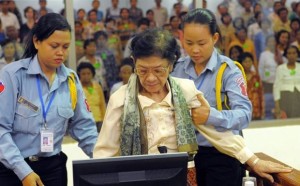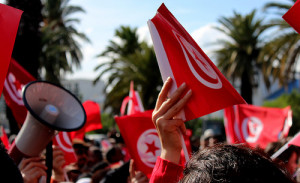by Tibor Bajnovič
 The Extraordinary Chambers in the Courts of Cambodia (‘ECCC’) confirmed that Ieng Thirith, the alleged Minister of Health and Social Affairs during Democratic Kampuchea, died on 22 August 2015 in Pailin province, Cambodia.
The Extraordinary Chambers in the Courts of Cambodia (‘ECCC’) confirmed that Ieng Thirith, the alleged Minister of Health and Social Affairs during Democratic Kampuchea, died on 22 August 2015 in Pailin province, Cambodia.
Ieng Thirith was allegedly the highest-ranking female officer during the Khmer Rouge regime, who also was Pol Pot’s sister-in-law, and the wife of Ieng Sary, the regime’s alleged Deputy Prime Minister and Minister of Foreign Affairs. She and her husband both studied in Paris during the 1950’s and later formed the core of the Khmer Rouge movement with Pol Pot.
On 15 September 2010, the ECCC Co-Investigating Judges indicted Ieng Thirith in Case 002 on crimes against humanity, genocide and Grave Breaches of the Geneva Conventions 1949 for her role in Khmer Rouge’s regime during 1975-1979.
Following multiple assessments by medical experts, the Trial Chamber of the ECCC unanimously found Ieng Thirith unfit to stand a trial due to her progressive dementia (in particular Alzheimer’s disease), and indefinitely stayed the proceedings against her. Consequently, Ieng Thirith was released from provisional detention on 16 September 2012, but remained under judicial supervision until her death.
After Ieng Sary’s death in 2013, the two remaining co-accused in Case 002 are Nuon Chea, the former Chairman of the Democratic Kampuchea National Assembly and Deputy Secretary of the Communist Party of Kampuchea, and Khieu Samphan, the former Head of State of Democratic Kampuchea.
The Case 002 has been severed into two separate trials, each addressing a different section of the indictment. The trial judgement in Case 002/01 was pronounced on 7 August 2014. Nuon Chea and Khieu Samphan were both found guilty of crimes against humanity and sentenced to life imprisonment. Following the appeals filed by both Accused, the appeal hearings in Case 002/01 commenced on 2 July 2015 and are ongoing. The trial hearings in Case 002/02 commenced on 17 October 2014 and are still ongoing.





